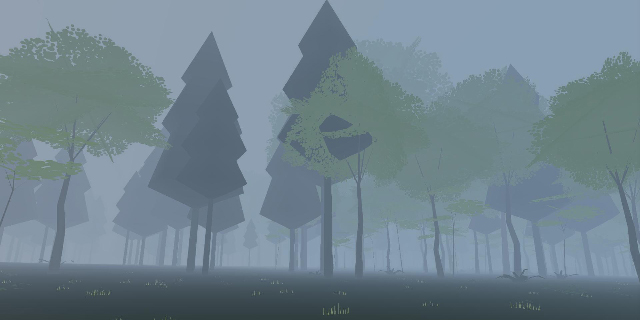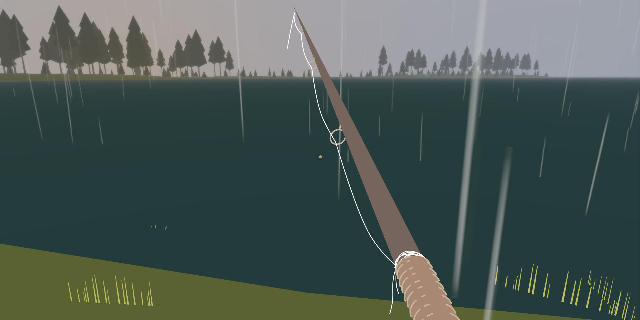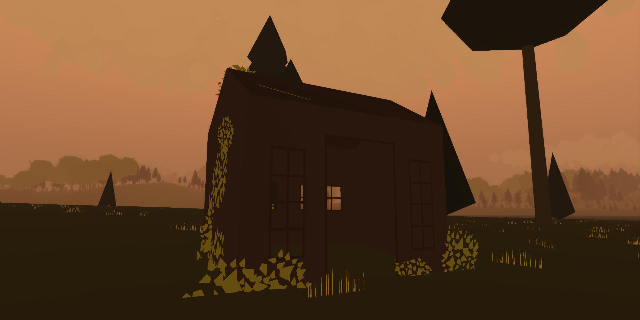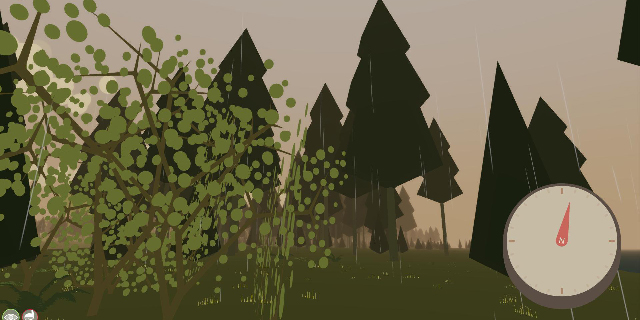
The “games as art” debate has been brewing more fervently for the past few years, with recent titles such as Proteus, Dear Esther and Gone Home serving as torchbearers for this movement. However, these titles, in which the gameplay mostly involves walking and exploring, stoke another debate: whether they’re “games” at all. For me, many of those games were incredible experiences that I would place right next to any I’ve had with more traditional art forms. Eidolon attempts to walk in the footsteps of the trailblazing games of this genre, but in doing so has gone too far. For the first time, I feel that I really understand the opinion of the other side. Eidolon is beautiful to look at and occasionally captivating, but the pace of the experience left me feeling uncertain.
Upon starting Eidolon, you’re given a glimpse into the game’s unique art style, which is at the same time minimalistic and highly stylized. You begin the game in a forest, and all of the objects of the game, from the trees to the bushes, are rendered as simple, textureless objects. This is absolutely a case where the whole is greater than the sum of its parts, as all of these simple objects combine to create scenery that you will find yourself admiring often.
When you begin, you are given immediate control of the character. There is no tutorial, no instruction, no guide and no goal; you are free to roam and explore as you choose. This is similar to other games that have attempted this style of play. There is a light survival element present, as you will need to eat when hungry, sleep when tired and stay out of the water for extended periods or risk freezing. Overall, though, these very rarely impact play. There is no penalty for death; you are simply revived somewhere else in the world.

Again like its inspiration, Eidolon’s narrative plays out through a collection of journal entries. You will find letters, diaries, newspaper clippings and other such memorabilia along your journey, in addition to maps and survival tools. There are a lot of things to collect, as the game teases over 150 different items to be found. The game is set in the slightly distant future in the state of Washington. There are no other people around, ruined buildings and abandoned cars are strewn about and the question you seek to answer through the written history you collect is why this came to be. This mystery establishes itself early, and in the beginning I was very committed to finding the answer.
After more time with the game, the glaring flaws of Eidolon become very apparent. The large, game-breaking issue lies in its pacing. You will spend hours exploring between journal entries. A game like Gone Home works because you are constantly progressing the narrative through the exploration, and likewise a game like Proteus works because the entire experience is contained to around an hour. Eidolon takes this same formula and stretches it to absurd lengths. In more than 20 hours, I found eight total journal entries. The aesthetic of the world can only carry it so far, and I found myself unbelievably bored within five hours. By 20, I could no longer care about the narrative at all.
To both Eidolon’s credit and disservice, it boasts an impossibly huge game world. It feels like I could walk in a given direction forever without reaching an artificial border. This world size, though, is a double-edged sword, as it makes it difficult to find points of interest, journal entries or basically anything. After a short time, everything begins to look very similar very quickly, and it’s also incredibly easy to get lost.

At one point, after a long time searching and finding nothing, I came across a deserted cabin. I hoped that this cabin would have something interesting to find, but after searching, I came up empty. I left, and an empty hour and a half later I stumbled, excitedly, across another cabin. Imagine my horror when I realized that this was, in fact, the same cabin I had explored earlier. I realized that I had spent the last hour and a half traveling in a large circle finding nothing, and to make matters worse, I couldn’t determine which direction I had taken to make that large circle. I frustratedly began my trek away from the cabin for a second time, just hoping that I wasn’t going to see it again in a short while. This experience is replicated over and over in the world of Eidolon.
The game does attempt to help the hopelessly lost, by providing a compass tool very early in the game as well as sprinkling maps of the various areas around the world. Unfortunately, these maps are typically hand-drawn, and it takes a considerable amount of effort to orient yourself with them and determine where you are currently located. I had a few situations when I was fairly confident of my position, only to walk in a given direction and stumble across a lake that, according to my map, shouldn’t have been there. This caused me to reassess my position, and after a couple of false starts I just gave up. At least now I know that if I were to be dropped into the wilderness and expected to survive, I would likely die immediately. If nothing else, this is at least a good thing to know.

Eidolon has an interesting look and tried and tested gameplay, but it overstays its welcome by a large margin. Games like Proteus and Gone Home, were criticized for being “walking simulators,” but I have never found a game more deserving of that title than Eidolon. When I was done playing, I felt weirdly hollow, like I missed something important. I had the nagging feeling during my playtime that I was always so close to finding something amazing, that it was just over that hill or just hiding on that distant island. Time and again I made the trip, climbed the mountain, crossed the gap and found nothing. Eventually I no longer had any desire to explore, I just wanted the game to end.
Pros: Captivating stylized art style, expansive world
Cons: Horrendous pacing, bare bones survival mechanic, complete lack of direction



















